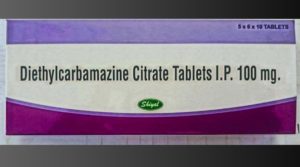
Ascaris nematode parasite on a petri dish

Pyrantel Pamoate Medicine: Comprehensive Overview
Table of Contents
Description:
Pyrantel Pamoate is an anti-parasitic medication used primarily for treating intestinal worm infections. It works by paralyzing the worms, causing them to be passed out of the body in stools. Commonly prescribed for infections like pinworms, roundworms, and hookworms, Pyrantel Pamoate is available in oral tablet and suspension form.
Uses:
- Pinworm infection (Enterobiasis)
- Roundworm infection (Ascariasis)
- Hookworm infection (Ancylostomiasis and Necatoriasis)
- Whipworm infection (Trichuriasis)
- Threadworm infection (Strongyloidiasis)
- Prevention of reinfection in parasitic infestations
- Mass deworming programs in endemic areas
- Alternative therapy for mixed helminth infections
Dosages:
Adults and children over 2 years: Typically, 11 mg/kg as a single dose for pinworm, roundworm, and hookworm infections.
Maximum dose: Not to exceed 1 gram.
Children under 2 years: Safety and efficacy not well established. Consult a healthcare professional before use.
Repeat Dose: Some infections, like pinworms, may require a second dose after two weeks to ensure complete eradication.
Side Effects:
- Nausea
- Vomiting
- Diarrhea
- Stomach cramps
- Dizziness
- Headache
- Drowsiness
- Skin rash
Brand Names, Companies, and Price (India/US):
India:
- Combantrin (GSK) – ₹30-50 for a single tablet.
- Helmex (Cadila) – ₹25-40 per tablet.
US:
- Pin-X (Reese’s) – $5-10 for 1 fl oz (suspension).
- Antiminth (Pfizer) – $20-25 per 500 mg tablet.
Some common brand names for Pyrantel Pamoate medicine include:
- Reese’s Pinworm Medicine
- Pin-X
- Combantrin
- Anthel
- Helmintox
These are widely available over-the-counter for the treatment of pinworm and other intestinal parasitic infections.
Mechanism of Action:
Pyrantel Pamoate works as a depolarizing neuromuscular blocker. It causes paralysis of the worm by inhibiting acetylcholine at the neuromuscular junction, preventing them from maintaining a normal hold on the intestinal wall. Once paralyzed, the worms are expelled from the body through peristaltic action.
Contraindications:
Hypersensitivity to Pyrantel Pamoate or any component of the formulation.
Hepatic impairment: Caution is advised due to potential liver effects.
Pregnancy: Although generally considered safe, consult a doctor before use.
Drug Interactions:
Piperazine: Pyrantel Pamoate should not be co-administered with piperazine, as the two drugs antagonize each other’s effects.
Levamisole: May lead to increased toxicity when used together.
Precautions:
Liver function: Monitor patients with pre-existing liver disease.
Reinfection risk: Educate patients on proper hygiene to prevent reinfection, particularly in cases of pinworm.
Gastrointestinal disturbance: The drug can cause mild to moderate gastrointestinal discomfort.
Patient Counseling Information:
Take the medication on an empty stomach, with or without food.
Maintain strict hygiene to prevent reinfection, including washing hands regularly, changing bed linens frequently, and not scratching the anal area.
Inform your healthcare provider if you experience severe side effects, such as persistent nausea, vomiting, or abdominal pain.
Selective Toxicity
The drug specifically targets the worms’ neuromuscular system without affecting the host (humans). Pyrantel pamoate is poorly absorbed from the gastrointestinal tract, meaning that most of it stays within the intestines, where it interacts with the parasitic worms.
Conclusion:
Pyrantel Pamoate is an effective and affordable solution for treating common intestinal worm infections. With proper use and precautions, it offers relief from parasitic infestations, contributing to better health outcomes in both individual and community settings.
References:
- National Institutes of Health. Pyrantel Pamoate: Drug Information.
- FDA Label for Pyrantel Pamoate.
- World Health Organization (WHO) guidelines on deworming.
Example:
A 30-year-old male with pinworm infection is prescribed Pyrantel Pamoate (Combantrin 250 mg). He takes a single dose of 750 mg (11 mg/kg), and after two weeks, a second dose is administered to prevent reinfection. During this period, hygiene measures such as handwashing and bedding changes are enforced.
Disclaimer:
This information is intended for educational purposes and should not be used as a substitute for professional medical advice. Always consult with a healthcare provider for proper diagnosis and treatment.
other link-https://en.m.wikipedia.org/wiki/Albendazole







